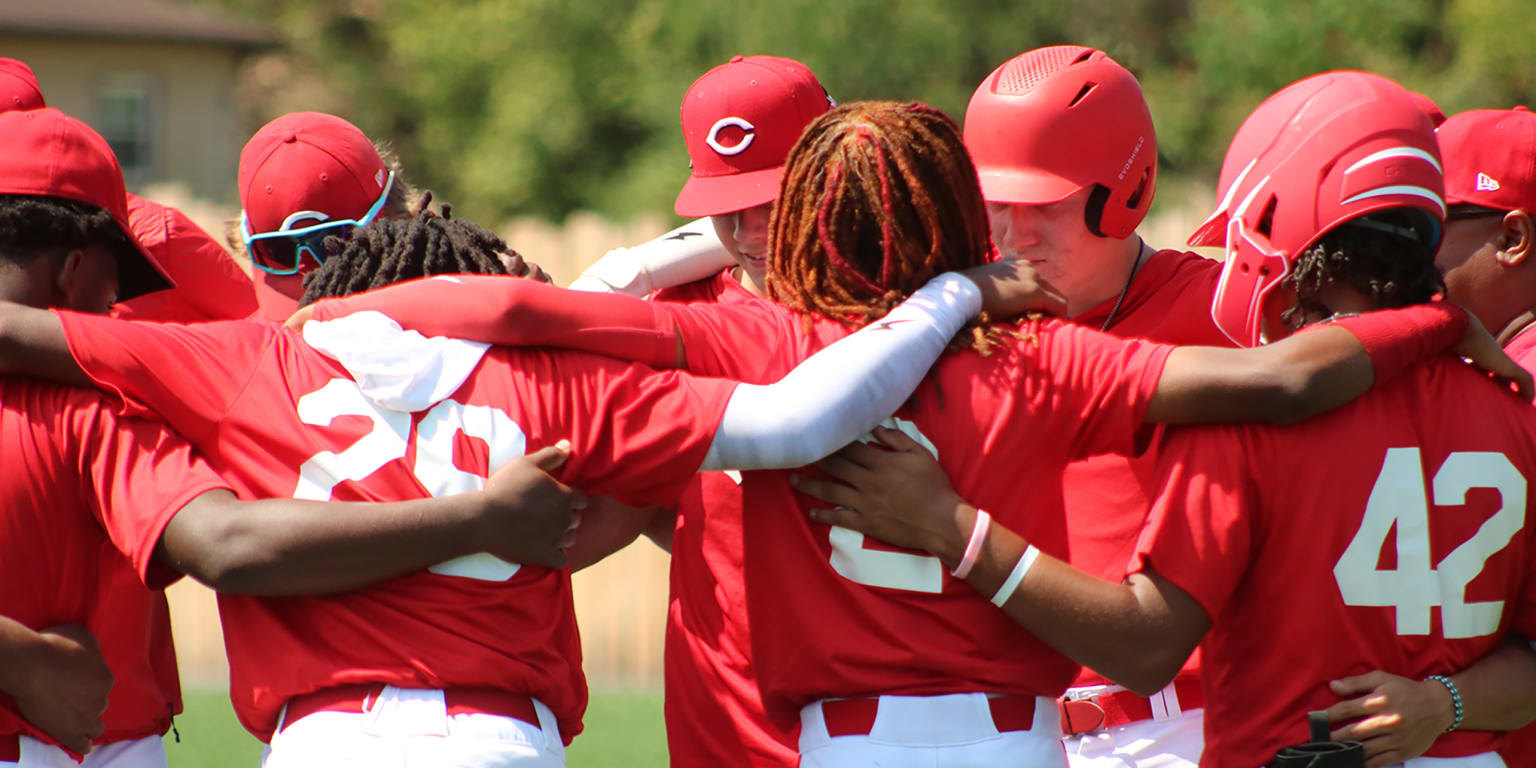Sports
Help support youth sports for #GivingTuesday

The Reds Community Fund is proud to once again participate in #GivingTuesday, the global day of giving that invites individuals to celebrate the spirit of the holiday season by giving back and initiating change in their communities and their world.
This year, the Reds Community Fund is focusing its fundraising efforts on offsetting the cost of equipment for young athletes throughout Reds Country. This is one of the most consistent demands through the Community Fund’s various programs, with requests easily exceeding $100,000 annually for equipment-focused funding.
One of the leading barriers preventing children from participating in youth sports is the cost of equipment. According to research from Project Play, kids from low-income families are six times more likely to quit playing a sport due to costs associated with the game. These rising costs in organized sports continue to create an economic divide in which these kids are priced out of the sports they love to play. With the bats, gloves, balls, helmets, uniforms, cleats and more required to play baseball and softball, there has never been a greater need to mitigate costs associated with youth sports.
Since its inception in 2001, the Reds Community Fund has supported youth baseball and softball programs throughout the region with monetary and equipment donations. Two of those institutions include North Hills Baseball and the Fayetteville Athletic Association (FAA). But with financial hurdles looming larger each year, it’s becoming increasingly difficult to help North Hills, Fayetteville and the countless other athletic programs to the extent that they need.
Bill O’Brien and Jeffrey Kitchen coach North Hills Baseball, part of District 2 in the North Region of Greater Cincinnati Knothole Baseball. The recreational baseball program targets boys and girls ages 5-9 and includes T-ball, coach pitch, D-1 and D-2. Participating families reside or attend school in either the College Hill or North College Hill communities.
O’Brien has been coaching baseball in some capacity for 40 years and Kitchen for 36 years. Their love and passion for introducing and teaching the game to kids is evident in their persistent efforts to rejuvenate and sustain baseball in two communities where participation has drastically declined.
“What we do is on a volunteer basis. Bill and I do this for the love of the game,” Kitchen said. “Baseball has been dying in the inner city, and what we’re trying to do is build it back up and give it life again. And the only way to do that is make it affordable and make it fun.”
Making it affordable is proving to be more and more challenging. With field permits (which are tripling in price this year), league fees, umpire fees and miscellaneous expenses that don’t include equipment and uniforms, Kitchen and O’Brien estimate they should be charging about $160 per child to cover all costs. But last year they charged just $60 for baseball — which they recognize still isn’t an insignificant number for many families — and $30 for T-ball.
“One of the fundamental concepts we have in our organization is that any child, regardless of parental income, plays,” O’Brien said. “If you can’t pay anything, you still play. We take people at their word. We’ve tried to price this so that price doesn’t add to the barrier, but rather it’s an inducement to try it. And we think that if kids try it, and it’s done properly and coached properly, they’ll enjoy the game, learn the sport, and learn a whole lot of other valuable lifelong lessons.”
When it comes to the equipment and uniforms, North Hills can only provide at the most basic level. Last year, they spent roughly $1,000 to purchase balls, bats and some catcher’s gear. However, most of the equipment is sourced from a stockpile of used inventory they’ve built up over time. For the uniforms, North Hills provides a T-shirt and gray pants. They used to provide a belt and socks but are no longer able to do so.
They often play against teams wearing new, flashy uniforms with the kids’ names on the back of their jerseys and using high-end equipment. The North Hills kids are already behind the eight-ball before they even take the field, and it’s noticeable.
“People naturally make comparisons,” O’Brien said. “If you’re a parent of a youngster playing on a North Hills baseball team and you’re playing team X from community Y and they’re dressed to the proverbial nines while your kid has a basic T-shirt and bland pair of gray pants, you’re going to notice that. And you’re going to wonder why your kid doesn’t have the degree of uniforms and gear that the opponents have.
“People don’t understand the cost structures we’re dealing with. They think you just roll the ball out on the field and start playing. It’s not that easy, but that’s part of the challenge of getting kids to play and stay playing. I think it’s really important for a kid’s self-image that a child feels good about him- or herself.”
The struggles to maintain youth baseball and softball programming extend beyond Cincinnati’s urban communities. It’s a systemic issue that’s affecting rural areas as well. Fayetteville Softball president Rachel Ray knows this all too well in her nearly nine years with the FAA, which is facing similar difficulties while trying to raise money and maximize resources.
The Fayetteville-Perry School District consists of three schools and an enrollment of approximately 942 students. In a small town with one gas station and one restaurant, local sponsorship is nearly impossible to come by.
Ray did a cost analysis for a player to participate in baseball or softball in their community. When considering the cost of a basic helmet, face mask, cleats, glove and league fees, it comes out to approximately $250 to $300 per child. And many families have multiple kids playing sports, which places an even larger burden on parents and their wallets.
“Our families can’t afford that,” Ray said. “And we know it’s a lot, so we offer scholarships now for families that have multiple kids, scholarships for people that just can’t do it.”
Through a lot of hard work and fundraising so far, they’ve been able to keep the cost to roughly $100 per child, but it’s becoming more challenging to maintain that price point.
With some additional assistance, they would be able to purchase some of the basic equipment and other necessities needed for a team to function while allowing for lower fees.
“There is not one kid in our area that wants to play baseball and softball that we say no to,” she said. “Money cannot be the barrier. It can’t, and it won’t. Not on my watch, not in our district.”
Just as North Hills is doing its best to try and level the playing field for their kids, so is the FAA. Ray notices the same thing O’Brien and Kitchen spoke about regarding the players’ uniforms and equipment.
It’s a big deal, especially at a young age, when kids see their opponents with better gear. That’s why Fayetteville has been allocating funds to provide their kids with the best possible equipment that still allows them to keep league fees low enough to continue enrolling players.
“We’re giving our players the opportunity to wear the same helmets as the kids that have the nicer things, to swing the bats that they’re going to see in travel ball, to have the nicer uniforms. There’s nothing that’s been more important than that,” Ray said. “When you’re a kid walking onto a field wearing old, used gear and everybody else has the nice stuff, you don’t play as good. You play how you feel. And when you get to wear the same things and swing the same bats that everybody else has, you feel equal to them. So, then it just becomes about play, about talent and hard work. And we can focus on those things, it’s really made a difference in our community.”
The coaches of North Hills and Fayetteville and the countless other volunteers involved in youth sports around the area know the value of introducing team sports such as baseball and softball to kids. The young athletes learn how to succeed and fail, how to win and lose, how to work together and so much more, all while building friendships along the way.
Every child deserves that opportunity, and that’s where Reds Country can make a difference.
“I know at every level, in every location, we try our best. But it has to be a group effort. It has to be communities coming together, larger communities coming together, and organizations that care about baseball and softball like we do, that make this happen for everybody,” Ray said. “I say it all the time to every player I get the opportunity to coach: ‘We can do hard things, and we can make great things happen.’ And with a little bit of help, we can continue to do that in our local communities. So please, please give if you can, donate if you can.”










